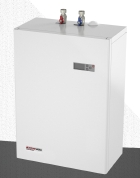Heatrae Sadia’s heat interface unit

Heatrae Sadia’s Hi-Max Instant ID heat interface unit provides space heating and domestic hot water to dwellings that are served by a district heating scheme or a centralised boiler system. These units have two plate heat exchangers — one for hot water and one for space heating — and are designed to minimise the return temperature to maximise the efficiency of the heating plant.
These units can be installed in the dividing wall between the dwelling and landlord space, providing easy access for inspection.
A heat meter can act as a localised control and meter in one, enabling landlords to take energy readings remotely — a popular choice for councils.
Units are factory set at 50°C for hot water and 60°C for heating. A first-fix rail means installers can minimise risk of damage or theft by completing the installation of the interface unit only at property handover.
A 2-speed pressure-independent controller output prevents overshoot of the temperature set point. An integral pulsed bypass function kicks in during periods of no heating to ensure the HIU is quick to respond when it is eventually used. They are suitable for single- and 2-zone heating systems.
Specification options include an underfloor-heating module.







